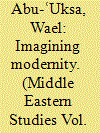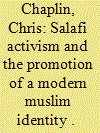| Srl | Item |
| 1 |
ID:
166763


|
|
|
|
|
| Summary/Abstract |
This article employs the methodology of conceptual history to contest two of the most common theoretical approaches dominating our understanding of modernity in the field of Middle Eastern studies. The first approach relies on the assumption of incompatibility between modernity and Islam and captures Arab modernity using concepts such as ‘adoption’. The second understands Arab modernity through concepts such as ‘imitation’, contending that it is a legacy of Western imperialism. This article challenges both theories by examining the genealogy of tamaddun (civilization, being civilized), a pivotal concept used in nineteenth-century Arabic to imagine modernity. The genealogy of tamaddun elucidates that medieval paradigms derived from the concept of madina (polity) were rediscovered, reimagined, and reused in the context of the rise of the nation-state and the challenge of Western imperialism. The article suggests understanding Arab modernity and its critique from within, rather than outside of, the temporality of the historical condition.
|
|
|
|
|
|
|
|
|
|
|
|
|
|
|
|
| 2 |
ID:
158202


|
|
|
|
|
| Summary/Abstract |
Indonesia has witnessed the emergence of a market of Islamic goods, services and media platforms that have catalysed a qualitative shift in the ways individuals come to express their religious convictions. Salafi Islam is no exception to this transformation, and this article provides a case study of contemporary Salafi propagation amongst Yogyakarta’s students and graduates. Through description and analysis of campus based religious lectures, websites, magazines and fashion outlets linked to the al-Atsary Islamic Education Foundation, this article explores the intricacies of campus affiliated da’wa. Linked to a ‘literalist’ interpretation of Islam reliant on scholars in Saudi Arabia, Salafism is frequently denounced as foreign to Indonesian norms. Yet, while activists do indeed promote a rigid adherence to Islamic tenets, they also align Islamic values to concerns with a modern Muslim identity. By framing Salafism as sensitive to ideas of professional employment, while juxtaposing it against images of a less well-educated rural Islam, they have thus have created a unique strand of urban Salafi propagation.
|
|
|
|
|
|
|
|
|
|
|
|
|
|
|
|